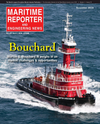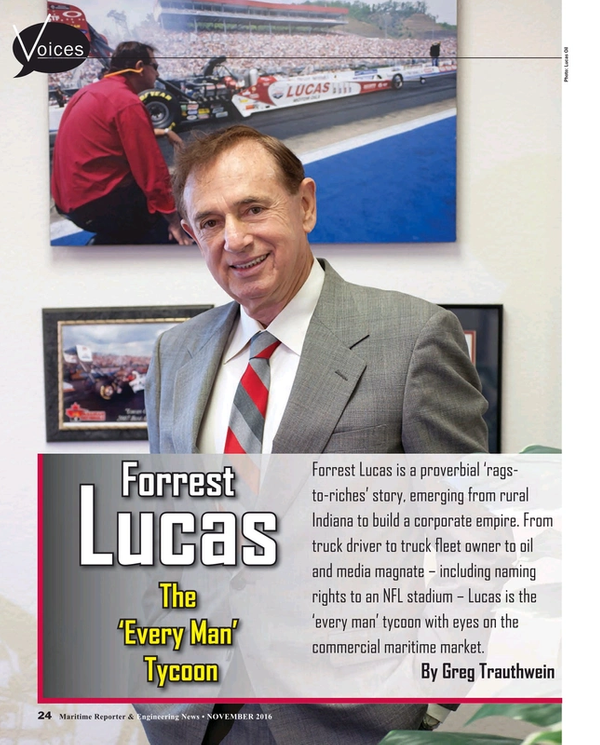
Forrest Lucas: The 'Every Man' Tycoon
By Greg Trauthwein
Forrest Lucas is a proverbial ‘rags-to-riches’ story, emerging from rural Indiana to build a corporate empire. From truck driver to truck fleet owner to oil and media magnate – including naming rights to an NFL stadium – Lucas is the ‘every man’ tycoon with eyes on the commercial maritime market.
Talk to Forrest Lucas for five minutes and it is easy to see that his claims to be a ‘regular guy’ – placing honesty and integrity at the forefront of all dealings – is earnest. Rising from modest means, early on Lucas combined an entrepreneurial spirit, a hard work ethic and an inventive mind. He readily admits that his path has been neither straight nor easy, insisting that lessons learned during the tough times are in part responsible for catapulting his business fortunes forward faster.
He had a tough early life, but collected great selling experience along the way. Importantly, he discovered early on that he had a talent for marketing, specifically appealing to the ‘every man.’
Lucas Oil Products, Inc., is a privately held lubricant and additive company with factories in California and Indiana, producing and marketing 270 unique lubricants and additive formulations in more than 40 countries. And while the Lucas Oil nameplate is the main feature of the Forrest Lucas story, it is but one chapter in the cumulative business portfolio, as he and his company have launched or revived major series of grassroots motorsports series, built a state-of-the art race track and drag boat lake, bought and expanded a television network, rescued a railroad, bought a corporate retreat, put his name on the NFL stadium which is home to the Indianapolis Colts, as well as returned to his roots breeding cattle, masterminded an agricultural initiative and launched a web app that revolutionizes motorsports television.
And he’s far from done.
From the Beginning
“You can’t build something like this without putting in a lot of hard work and making a lot of sacrifices,” said Lucas in a recent interview with Maritime Reporter & Engineering News. “Honesty and integrity are a huge part of my success.”
Born in 1941, Lucas had a modest and common goal: get a good job to make enough money to support a family. Fueled by a boyhood dream of being a truck driver, at the age of 18 Lucas had saved enough money to buy a 1948 Ford dump truck powered by a ’55 Thunderbird engine to haul dirt and gravel. Three years later he bought a new 1963 Chevrolet, C-60 series with a 327-cubic-inch gas engine and signed on with Mayflower Moving and Storage, serving as the youngest owner-operator in the fleet.
By the age of 40 he was done driving and was managing his small fleet. “I had about 14 trucks at that time, and I was brokering freight on the side. I was the first guy in the country to get full 48-state authority, to haul anything, anywhere and I never looked back.” But his fleet increasingly encountered maintenance problems, mainly due the extreme high temperatures of the Arizona, Nevada and California deserts. Through adversity a solution, and eventually an empire, were born.
Founding Lucas Oil Products, Inc.
Forrest Lucas’ formal education ended with high school, but an inventive mind and curious spirit led him to teach himself how to make better oils than he could buy off the shelf. He converted part of his small warehouse and parking lot in Chino, Calif., and set himself up as a home chemist. In his spare-time he hunted through chemical junk yards taking a little of this and a little of that and began mixing and matching his own lubricant formulas.
Forrest says that on one of his expeditions, the proprietor of one of these junk yards called his attention to a particular rusted up barrel, which he found to be a very pure form of synthetic oil. He took the barrel home and began mixing the contents and trying differing formulas in his trucks. It would be easy to say that success was assured, but what actually happened was that within a few months his wife and business partner Charlotte, who also acted as the company’s bookkeeper, reported that maintenance costs were down. Way down.
With that the Lucas’s began to market their ‘Heavy Duty Oil Stabilizer’ for engines and gearboxes, initially by supplying it to their trucking friends. Word of mouth coupled with a mini-recession in the trucking industry drove Forrest to the conclusion that his family’s future was in oil, so Lucas Oil Products, Inc. was born.
“I think getting started was the hardest part. We were winging everything! We had to do without. It was a struggle, and we had to look everywhere for business.”
Turning the Page
Once Lucas Oil Products passed a critical mark of profitability, the rest, as they say, is history. Lucas took a shine to promoting his burgeoning brand via motorsports, and that combination led him to accumulate and consolidate a number of racing series and media properties under his banner, all the better to ensure that his company had top billing. Motor racing was a pivotal choice: “We got into the entertainment business to sell oil” said Forrest, “and nothing is more entertaining than fast cars, trucks, planes and boats.” Another pinnacle was his $121.5m, 20-year deal in February 2006 for the naming rights to Lucas Oil Stadium.
“I couldn’t have imagined the things we’ve done,” said Lucas. “We have a television station and television series, we’re making movies and I have a 16,000 acre cattle ranch; all of these things are above and beyond making oil products.”
While his business success is well-documented, so too is his adherence to his modest roots. His ‘everyman’ philosophy extends in-house to his penchant for promoting from within. “I run the company as a team: Everyone has an open door, and I give everyone the opportunity to learn, and encourage emerging leaders to train their lieutenant,” said Lucas.” I try to promote people from the ranks, coming up from the bottom. Instead of hiring someone who walks in the front door with a suit and tie on, I try to find talent in our ranks. It’s hard to come in from the top and really know a business. A lot of people have the talent and the brains; they just haven’t had the chance.”
Forrest Lucas on:
Promoting from within:
“A lot of people have the talent and the brains; they just haven’t had the chance.”
His company & change:
“I have not changed, my wife has not changed, my son has not changed. I’m still a regular guy. I live in a fancy house, but I don’t ‘put on the dog.’ I’m honest with everyone, and I expect all of my employees to be honest too.”
His greatest business challenge”
“I think getting started was the hardest part. We were winging everything! We had to do without. It was a struggle, and we had to look everywhere for business.”
What makes him most proud:
“The naming rights to the stadium (a reported $121.5m over 20 years) was a pretty big deal, but I’m most proud of my employees. Our employees don’t look at Lucas Oil as a job, they look at it as a career.”
His management philosophy:
“I run the company as a team: everyone has an open door, I give everyone the opportunity to learn, and I encourage emerging leaders to train their lieutenant. I try to promote people from the ranks, coming up from the bottom. Instead of hiring someone who walks in the front door with a suit and tie on, I try to find talent in our ranks. It’s hard to come in from the top and really know a business.”
Lucas Marine & Harbor Breeze Cruises Partner
Forrest Lucas said that early on in the company’s history he knew he had fuel stabilizers and oil treatment that the maritime industry could use, but the main reason that the company got into the industry was because of ethanol in the fuel. “We received many calls from people asking us to make a methanol treatment for boats” said Lucas.
“We continued to get calls asking us to create other fuel and oil products, and before you knew it we had a full line,” that helped to cut emissions and improve performance.
One testament to the line is Harbor Breeze Corp., which manages an eight-boat fleet with vessels ranging from 30 years to five months, with the latest addition being the new La Espada, a $4.5m vessel delivered in May 2016.
Lucas Marine partnered with Harbor Breeze to help reduce the yacht charter and the cruise company’s fuel costs, maintenance and environmental impact in Los Angeles and Long Beach Harbors.
“We have been searching for ways to increase fuel economy in our entire fleet, add speed and reduce maintenance costs,” said Dan Salas, CEO, Harbor Breeze.
“We operate in a sensitive environment with large and small cruise ships hosting charters along the West Coast including Catalina, harbor tours and whale watching, and we invest heavily in improving our performance.”
“Since January of 2016 we have used Lucas Marine Products exclusively throughout our fleet and our tests have shown that Lucas Oil SAE 15W40 Magnum Diesel oil significantly reduces engine noise, wear and tear in our crankcases and allows for more operating hours before needing to be changed,” said Salas. “Also, Lucas Marine Upper Cylinder Fuel Treatment lubricant is giving us a substantial, often as much as 8% increase in fuel economy overall, and this is huge.”
(As published in the November 2016 edition of Maritime Reporter & Engineering News)
Read Forrest Lucas: The 'Every Man' Tycoon in Pdf, Flash or Html5 edition of November 2016 Maritime Reporter
Other stories from November 2016 issue
Content
- America Needs Icebreakers page: 10
- Could Offshore Crewing Requirements Make Things Worse? page: 16
- The Training Implications of Subchapter M page: 19
- Forrest Lucas: The 'Every Man' Tycoon page: 24
- Talking Dutch Designs with Damen’s Peter Robert page: 30
- Ken Konrad: A Driven Innovator page: 36
- Southern Exposure: Wilson Sons' Sergio Guedes Talks Towage page: 42
- Fuel Talk: Greener Ships 'Abandoned' page: 44
- Innovation in Offshore Transfer of LNG page: 48
- R.W. Fernstrum: Keeping Things Cool for 67 Years page: 54
- Interview: Morton S. Bouchard III Pulls No Punches page: 58
- ‘The Best Kept Secret in Shipbuilding’ page: 64
- Crowley's Petroleum Transport Unit Takes the Long View page: 70
- Arpoador Shipyard and Pre-salt FSVs page: 78


